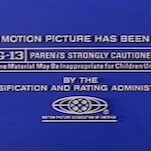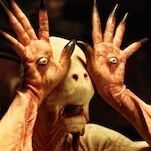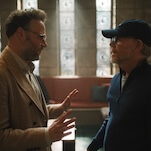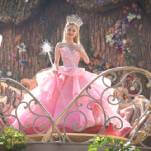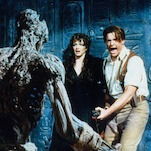Simone

Looking a few steps ahead of the digital vanguard, Andrew Niccol's clever comedy Simone imagines a future in which special effects not only overwhelm the actors, as they often do today, but become the actors themselves. Niccol (Gattaca), whose ingenious script for The Truman Show satirized the growing giant fishbowl of reality television, creates another cool, synthetic world that's made to seem better than the real thing—cleaner and more manageable, without the hassles of imperfection. For Al Pacino, a pretentious film director on a losing streak, Simone is a control freak's dream: an all-digital composite of great actresses throughout history, infinitely flexible and ready to be molded on his command. He considers her a throwback to the Golden Age, when the studios owned the stars, but she's even better, with no salary demands, no entourage, and no outsized ego to contend with his own. After a pampered star (Winona Ryder) drops out of his latest picture during shooting, Pacino salvages the footage by replacing her with Simone (short for "Simulation One," and played by Rachel Roberts), a gift from an eccentric software wizard who takes his secret to the grave. Pacino expects to be arrested for fraud, but when flummoxed audiences turn his unknown star into an overnight success, he finds himself back in the good graces of studio boss (and ex-wife) Catherine Keener, who's eager to produce a follow-up to Simone's debut. The virtual celebrity's natural reclusiveness only adds to her mystique, but it also puts additional pressure on Pacino, who scrambles to keep the wolves at bay while making a new film without his lead actress on the set. Simone seems likely to be tagged as a Hollywood satire—which, in its weaker moments, it is—but Niccol is more interested in lampooning the vanity of self-important artistes, as well as the star-making machinery that can render a real actor just as phony as a digital impostor. The best scenes play like Frankenstein revisited, with a comically bedraggled Pacino cast as the mad scientist trying to protect his runaway creation from a rabid public. Using an empty soundstage as a lab, he feeds her every line and gesture, controls her publicity, and makes her into a pop superstar, but she mostly exists to reaffirm his directorial genius. As Pacino's attempts to hide his creation grow more desperate, Niccol similarly starts to lose control, falling back on cheap gags and increasingly implausible plot turns in order to wrangle a story that gets away from him. Niccol has yet to make a film that follows through on his massive ambition, but with conceits as brilliant as Simone's, he can get away with leaving them only partially realized.
